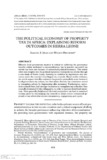The Political Economy of Property Tax in Africa: Explaining Reform Outcomes in Sierra Leone
| dc.contributor.author | Jibao, Samuel S. | |
| dc.contributor.author | Prichard, Wilson | |
| dc.date.accessioned | 2018-05-04T10:31:51Z | |
| dc.date.available | 2018-05-04T10:31:51Z | |
| dc.date.issued | 2015-05-28 | |
| dc.identifier.citation | Jibao, S.S. and Prichard, W. (2015) The political economy of property tax in Africa: Explaining reform outcomes in Sierra Leone, African Affairs, 114/456, 404 – 431. | en |
| dc.identifier.uri | https://opendocs.ids.ac.uk/opendocs/handle/20.500.12413/13721 | |
| dc.description.abstract | Effective local government taxation is critical to achieving the governance benefits widely attributed to decentralization, but in practice successful tax reform has been rare because of entrenched political resistance. This article offers new insights into the political dynamics of property tax reform through a case study of Sierra Leone, focusing on variation in experiences and outcomes across the country’s four largest city councils. Based on this evidence, the article argues that elite resistance has posed a particularly acute barrier to local government tax reform, but that ethnic diversity has sometimes served to strengthen reform by fragmenting elite resistance. Furthermore, opposition councils have had stronger incentives to strengthen tax collection than councils dominated by the ruling party, in order to increase their fiscal autonomy. More generally, heightened electoral competition can lead to sustained revenue gains by encouraging city councils to adopt a more contractual approach to tax reform that stresses transparency, engagement, and equity. | en |
| dc.language.iso | en | en |
| dc.publisher | Oxford University Press | en |
| dc.relation.ispartofseries | African Affairs;Vol 114 | |
| dc.rights | © The Author 2015. Published by Oxford University Press on behalf of Royal African Society. This is an Open Access article distributed under the terms of the Creative Commons Attribution Non-Commercial License (http:// creativecommons.org/licenses/by-nc/4.0/), which permits non-commercial re-use, distribution, and reproduction in any medium, provided the original work is properly cited. For commercial re-use, please contact journals. permissions@oup.com | en |
| dc.rights.uri | http://creativecommons.org/licenses/by-nc/4.0/ | en |
| dc.subject | Governance | en |
| dc.title | The Political Economy of Property Tax in Africa: Explaining Reform Outcomes in Sierra Leone | en |
| dc.type | Article | en |
| dc.rights.holder | © The Author 2015. | en |
| dc.identifier.externaluri | https://academic.oup.com/afraf/article/114/456/404/24597 | en |
| dc.identifier.team | Governance | en |
| dc.identifier.doi | https://doi.org/10.1093/afraf/adv022 | |
| rioxxterms.funder | Default funder | en |
| rioxxterms.identifier.project | Default project | en |
| rioxxterms.version | VoR | en |
| rioxxterms.versionofrecord | https://doi.org/10.1093/afraf/adv022 | en |
| rioxxterms.funder.project | 9ce4e4dc-26e9-4d78-96e9-15e4dcac0642 | en |
Files in this item
This item appears in the following Collection(s)
Except where otherwise noted, this item's license is described as © The Author 2015. Published by Oxford University Press on behalf of Royal African Society. This is an Open
Access article distributed under the terms of the Creative Commons Attribution Non-Commercial License (http://
creativecommons.org/licenses/by-nc/4.0/), which permits non-commercial re-use, distribution, and reproduction
in any medium, provided the original work is properly cited. For commercial re-use, please contact journals.
permissions@oup.com


